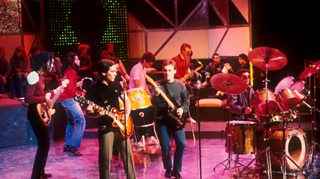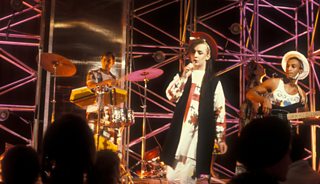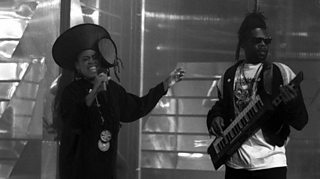BBC Music: My Generation - In Conversation With … Sheryl Garratt
Jon Jacob
Editor, About the BBC Blog
Journalist Sheryl Garratt is one of a handful of contributors who appears in the 80s edition of the BBC Music documentary Jazzie B’s 1980s: From Dole to Soul – part of the BBC Music: My Generation season.
This November, BBC Two, BBC Four and BBC Radio will be taking viewers on a trip back to the 1980s for the next instalment of BBC Music: My Generation.
Programming across TV and Radio will take a look back at some of the seminal moments from the decade through the eyes of the people who were there. BBC Music: My Generation airs in five instalments with the fans and the musical icons of the time giving their own unique perspectives, and so far this year, we’ve explored the 1950s, 1960s and 1970s.
We spoke to Sheryl about her experience of the 80s, the music she loves and why it was important to her.
How did you get into music journalism?
I just loved music as a kid - I was just obsessed with it. It was a case of time and place that I was in Birmingham when the music scene was fantastic. The Au Pairs, The Beat and UB40 were all friends. 2 Tone was kicking off in Coventry. NME needed someone to write about that. I was writing a truly awful fanzine – the main thrust of which was Birmingham is great, and everywhere else is rubbish.
Even though it was a huge city, the number of people actually going out to gigs was quite small. We all knew each other. For example, The Beat had a weekly residency in a city centre pub, and sometimes there were more on stage than there were in the audience. Everybody knew each other either by sight or by name. We all went to the same parties; we all went to the same gigs.
Did you see those music-playing friends – UB40 for example – as celebrities at that stage?
My impression was that you formed a band, did some gigs, after a while you put out a single and then soon after you went on Top of the Pops. I just assumed that was what happened because that was what was happening in Birmingham. Firstly, it just so happened that Birmingham’s bands were all very good and secondly, the whole Midlands scene was very ‘hot’ at the time. When you’re sixteen and that’s happening to your friends you assume that’s what happens to everyone. I was really shocked later on when I realised that that isn’t the natural trajectory for all bands.

UB40 performing on Top of the Pops in 1980
Some might assume that the 80s was all shiny pop. How do you see it musically?
I thought 2 Tone was angry and really articulating how the working class had been left behind. Culture Club now is seen as this cosy pop band, but at the time to see a boy dressed like a girl was shocking. I remember my Dad being incredibly upset by Culture Club when he first saw them on TV, and also by Annie Lennox. Those looks were very radical at the time.

Boy George (centre) performing with Culture Club on Top of the Pops in 1982
Now it looks slightly meaningless because we’re used to seeing that, but at the time it was very very radical. Imagine being worried about being gay at the age of 14, and then seeing Boy George on Top of the Pops. It must have been an amazing moment.
There hadn’t been anything like that since Marc Bolan or Bowie.
Is there a need to re-contextualise the period so we understand its original impact better?
Yes, I think so. Pop culture is always pushing at the edges. After a while everyone gets used to that and then that culture becomes mainstream. The celebrations of Bowie’s life when he died compared the anger, fury and fear in the 70s when he was doing some of the stuff he was doing – people get used to it and it helps make things normal. That is the point of popular culture. It’s kids pushing at the envelope.
Decades are always convenient ways of marking periods out, of seeing a new generation come through. I think the 80s began in 1979 with this burst of post-punk indie pop music and ended in 1989 when rave music entered the charts and became mainstream.
What was the essence of the 80s for you?
There were two things going on at once. There was a shiny kind of pop music and a thriving club culture, but it was also an era when people were suffering a lot – there was a lot of struggle for a lot of people. You can look at the 80s and think it was Duran Duran swanning around the world in colourful baggy shirts. For a lot of people it was a grey decade when they were excluded from things.
Is there a period of music that really excites you?
Every period – whichever period I find myself in.
It’s always the moment you’re in that is exciting. I’ve been really lucky in that I’ve been in the right place at the right time. The music in Birmingham was really exciting. There was loads going on. When I moved to London I was lucky to end up in the middle of the vibrant 80s club scene, warehouse parties, things like that. Again very lucky when Acid House kicked off. Those DJs who went off to Ibiza and came back to open acid house clubs happened to be friends of mine. Whenever something exciting has happened I’ve always been lucky enough to be around. And now I have a 20 year old son who is equally excited about music – he brings things home too.
What do think you’ve got from that obsession?
A sense of belonging I think – I’m in amongst people I relate to. That’s different now when I go to gigs because the crowd is often a whole lot younger than me. Certainly growing up and in my 30s this was all going on around me and I felt a part of it. And Jazzie B and Soul II Soul and the whole thing they set up at the Africa Centre was one of those places. Here was something really exciting made by people who were playing music they loved without compromising. It was an exciting thing to watch and be part of.
Is there a potential for music to still bring people together given that we consume that music on-demand?
Yes. It just happens in a different way. I don’t think we’ll ever go back to the time when NME was the bible of music you got as soon as you could on a Thursday morning in Birmingham; you scoured the singles reviews then on Saturday you took a long bus ride to the only independent record shop, where you asked them to play three singles to decide which you wanted to buy. That’s never coming back. But my son’s generation are all about the live performance. Look at events such as Radio 1’s Big Weekend or Glastonbury – you see hundreds of thousands of people coming together sharing a love of music. It’s moved to concerts and live events rather than owning the tunes.
Does that shift the emphasis back onto musicians and musicianship?
Absolutely. This is a difficult time for record companies, but I don’t think it’s a difficult time for musicians. It’s a great time for musicians. No matter how niche your music is because of the internet you’re going to find a couple of thousand people across the world who will like your music.
What was the draw for you to get involved in this documentary?
I’ve done quite a few shows with Matt [the director] over the years. He is lovely to work with. When he asks me to do things I do them if I can. He really cares about the people he’s working with and trying to represent. He cares about trying to get that right within all the limitations of a short clip programme.
Tell us your thoughts about the documentary
I’m really glad that what Soul II Soul achieved is being celebrated. I think they were incredibly important as a group, as businessmen and as musicians. They were a black-run business doing things on their own terms in a way that was incredibly inclusive. Anyone could come to their events. Everyone was welcome.

Soul II Soul's Jazzie B and Caron Wheeler on Top of the Pops in 1989
I think that’s what has always been extraordinary about British youth culture. At its best it embraces everyone and Soul II Soul were just a shining example of that.
For people, especially in America, it was the first time they’d realised there was a big black community in Britain and that they could have a sound of their own that wasn’t necessarily derived from American traditions.
I think it was the start of British dance music seeming very confident that it had its own sound which has led to all the music we have now.
Sheryl Garratt is a freelance writer covering all aspects of popular culture.
- Jazzie B's 1980s: From Dole to Soul will be shown on BBC Two on Saturday 26 November at 10.30pm and available to watch on BBCiPlayer for 30 days after broadcast.
- Find out more about music of the 50s 60s and 70s on the My Generation website.
